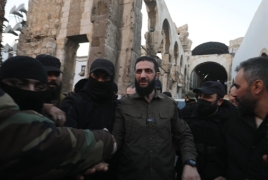
Syria’s interim president, Ahmed al-Sharaa, is set to arrive in Ankara for discussions with Turkish officials regarding the rebuilding of Syria and the complex issue of Kurdish militants near the shared border.
Sharaa is expected to land in Turkey in the afternoon, flying in from Saudi Arabia, where he made his first international visit following the December 8 overthrow of Syria’s long-standing leader, Bashar al-Assad, by Islamist-led rebel forces Turkish Minute reports.
This development has left Syria—bordering Turkey for 900 kilometers (560 miles)—in a fragile transitional period, grappling with governance and territorial challenges.
Following his diplomatic visit to Saudi Arabia, Sharaa is aiming to maintain balanced regional relationships by leveraging his longstanding strategic ties with Ankara.
Sharaa’s visit on Tuesday, which was “at the invitation of President Recep Tayyip Erdoğan,” will include a meeting at the presidential palace, according to the Turkish leader’s office.
The discussions will focus on “joint steps to be taken for economic recovery, sustainable stability, and security,” Erdoğan’s communications director, Fahrettin Altun, wrote on X.
Despite facing its own economic difficulties, Turkey has expressed willingness to assist Syria in recovering from its devastating 13-year civil war.
In exchange, Ankara hopes to secure Damascus’s backing against Kurdish militants in northeastern Syria, where the U.S.-backed Syrian Democratic Forces (SDF) have been in conflict with Turkish-supported groups.
Turkey opposes the SDF, asserting that its primary faction, the People’s Protection Units (YPG), has ties to the Kurdistan Workers’ Party (PKK), an organization outlawed in Turkey for separatist activities.
The Kurdish-led SDF currently controls a significant portion of Syria’s northeast, a region rich in oil resources, where they have enjoyed de facto autonomy for over a decade.
Turkey has repeatedly warned of military action to prevent Kurdish forces from operating near its borders, despite U.S. attempts to mediate a settlement.
Ankara has maintained a strong influence in Syria’s northwestern Idlib region, which had been under the control of a coalition led by Sharaa since 2017. Turkey also continues to maintain military bases in northern Syria.
Previously, Sharaa’s former group, the Hayat Tahrir al-Sham (HTS) rebel movement, was “always careful not to engage in fighting with the SDF, despite Turkish pressure,” according to a Western diplomatic source.
While Turkey continues its efforts to counter Kurdish fighters in Syria, it has simultaneously extended a potential overture to Abdullah Ocalan, the jailed founder of the PKK, hinting at the possibility of him calling on his followers to abandon armed resistance.
Such an appeal could be directed at the PKK’s military leadership in both Syria and Iraq.
“Erdoğan does not want a Kurdish entity on his doorstep” in Syria, stated Hamit Bozarslan, a Paris-based expert on Kurdish affairs.
At the same time, Sharaa “recognizes the role played by the Kurds who remained neutral (during his rise to power) and understands the necessity of working with these factions,” he told Agence France-Presse.

